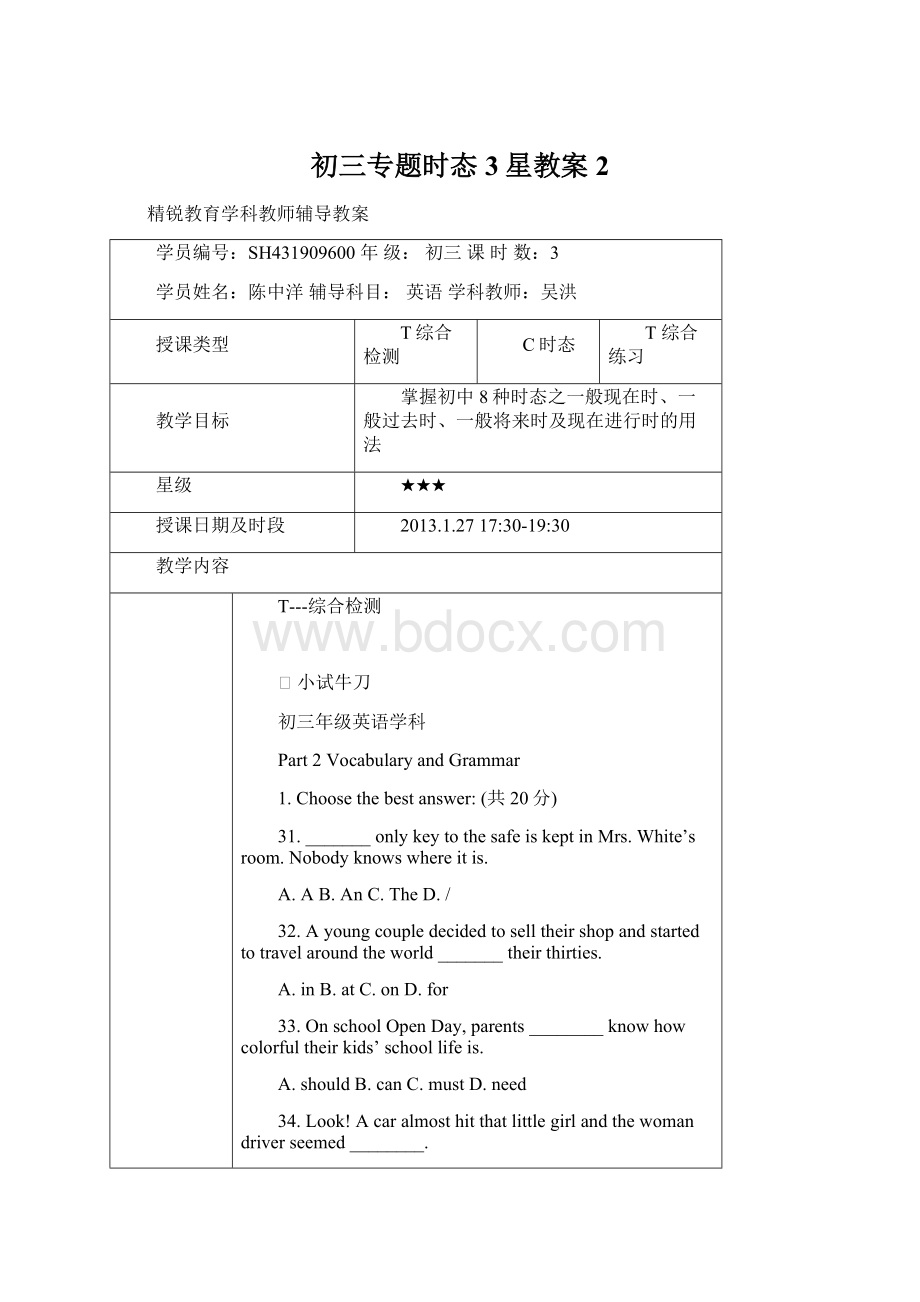初三专题时态3星教案 2.docx
《初三专题时态3星教案 2.docx》由会员分享,可在线阅读,更多相关《初三专题时态3星教案 2.docx(17页珍藏版)》请在冰豆网上搜索。

初三专题时态3星教案2
精锐教育学科教师辅导教案
学员编号:
SH431909600年级:
初三课时数:
3
学员姓名:
陈中洋辅导科目:
英语学科教师:
吴洪
授课类型
T综合检测
C时态
T综合练习
教学目标
掌握初中8种时态之一般现在时、一般过去时、一般将来时及现在进行时的用法
星级
★★★
授课日期及时段
2013.1.2717:
30-19:
30
教学内容
T---综合检测
v小试牛刀
初三年级英语学科
Part2VocabularyandGrammar
1.Choosethebestanswer:
(共20分)
31._______onlykeytothesafeiskeptinMrs.White’sroom.Nobodyknowswhereitis.
A.AB.AnC.TheD./
32.Ayoungcoupledecidedtoselltheirshopandstartedtotravelaroundtheworld_______theirthirties.
A.inB.atC.onD.for
33.OnschoolOpenDay,parents________knowhowcolorfultheirkids’schoollifeis.
A.shouldB.canC.mustD.need
34.Look!
Acaralmosthitthatlittlegirlandthewomandriverseemed________.
A.frightB.frightenC.frightenedD.frightening
35._________Jeremybrokehisleglastyear,heperformedverywellonthebasketballcourtinthenewseason.
A.WhenB.BecauseC.AlthoughD.If
36.Afterthediscussion,mostpeopleatthemeetingchooseJane’splaninsteadof_______.
A.IB.myC.meD.mine
37.Itisessentialforagooddetective_______theinnocentandtofindtheguilty.
A.toprotectB.protectingC.protectD.protected
38.Itisknowntoallthatbadnewshaswingsandalways_______veryfast.
A.spreadB.spreadsC.isspreadingD.hasspread
39.A:
_______lecturewillyouattend,ProfessorWang’sorProfessorLi’s?
B:
ProfessorLi’s.Hislectureismoreinteresting.
A.WhereB.WhoseC.WhenD.Why
40.Jenniferhastwochildrenand________ofthemwereborninwinter.
A.allB.eitherC.bothD.neither
41.People______aboutiftherearealiensontheotherplanetssincemanyyearsago.
A.arearguingB.argueC.havearguedD.argued
42.Terrydidverywellintheinterview,_______hegothisdreamjobinIBM.
A.forB.soC.butD.or
43.Whenourparentsgetold,theywillneed______ofourtimeandattentionthanbefore.
A.manyB.moreC.lessD.few
44._______cametoseeJohnthismorningandleftanoteonhisdesk.
A.SomebodyB.AnybodyC.EverybodyD.Nobody
45.Inthatsmallseasidevillage,mostchildrenaregoodat_____.
A.swimB.swamC.swimmingD.swims
46.________amazingfilmTheStoryofPiis!
A.HowB.WhataC.WhatanD.So
47.Spendingawholedayworkinginthefieldletthechildren_______thefarmers’hardlife.
A.understandB.tounderstandC.understoodD.understanding
48.Thekidsaretaughttostaycalmandgooutofthebuildingonebyone_______thereisafire.
A.untilB.becauseC.ifD.although
49.A:
IamafraidIcan’tfinishmyreportontime.It’ssodifficult.
B._______
A.Sorry!
Idon’t’know.
B.Thatreallysoundsgood!
C.Takeiteasy.MaybeIcanhelp.
D.Thankyoufortellingme!
50.A:
Wouldyouliketohavealookatmynewpainting?
B:
_______
A.Youarewelcome!
B.I’llbegladto.
C.Notatall!
D.Congratulations!
2.Completethesentenceswiththegivenwordsintheirproperforms.(共8分)
59.MoYanisthe________ChinesetowintheNoblePrizeinLiterature.(one)
60.AfterAndywasretired,thecompanywantedtofindanew________urgently.(drive)
61.Chinesepeople________cleantheirhousesbeforetheSpringFestival.(usual)
62.Mrs.Andersonhasalittlegardenandshegrowssome__________init.(tomato)
63.LiuXiangreceivedan__________intheUSAanditwasverysuccessful.(operate)
64.Accordingtotheplantheyhavemade,Iamsuretheywon’t_________.(success)
65.Thechemicalsinthebottlearedangerousanditmustbe________lockedinthelab.(secure)
66.Whenthenewscame,everybodywas_______attherarefloodinBeijing.(shock)
3.Rewritethefollowingsentencesasrequired.(14分)
67.Iprefertosleepwiththewindowwideopenunlessit’sreallycold.(保持句意不变)
Iprefertosleepwiththewindowwideopen________it_______reallycold.
68.Schoolsshouldoffermorefruitsandvegetablestostudentsintheirmealseveryday.(改为被动语态)
Morefruitsandvegetablesshould______________tostudentsintheirmealseveryday.
69.TheKoreanpopmusicvideoGangnamStyleisverypopular.Manypeoplewouldliketolearnthefunnydance.(合并两句,保持句意不变)
TheKoreanpopmusicvideoGangnamStyleis________popular________manypeoplewouldliketolearnthefunnydance.
70.LittleLucyhaslearnttoplaythepianosinceshewasfiveyearsold.(就划线部分提问)
______________haslittleLucylearnttoplaythepiano?
71.Thereislittletimeleftforustoworkoutasolution.(改为反意疑问句)
Thereislittletimeleftforustoworkoutasolution,_______________?
72.Iwondered.WillJackrecognizemeaftersuchalongtime?
(合并两句)
Iwondered_______Jack________recognizemeaftersuchalongtime.
73.Remembertosaysorrytoothersifyoudosomethingwrong.(保持句意不变)
Rememberto_____________othersifyoudosomethingwrong.
聚沙成塔:
每一次的积累,都会是你成功的垫脚石!
1.————————————————————————————————2.————————————————————————————————3.————————————————————————————————4.————————————————————————————————5.————————————————————————————————6.————————————————————————————————7.————————————————————————————————8.————————————————————————————————
T---专题
(建议5分钟)
亲爱的同学,你能把小新和同学的对话翻译成英文吗?
-Xiaoxin,areyouinnow?
-I’mbathingnow.
-Doyouusuallybatheatthistime?
-Iusednottobe,butIdonow,andIwillfromnowon.
你认为上面这4幅图包含了几种时态?
(注意英汉的互通性哦~~)
Keys:
一般现在时,现在进行时,一般过去时,一般将来时。
教法:
导入中的4幅图片选择了学生普遍熟知的蜡笔小新,图片都是中文对话,首先让学生把简单的小对话翻译成英文,通过蜡笔小新和同学的对话引出本次课的授课主题—初中必考8种时态中的4种时态:
一般现在时,现在进行时,一般过去时,一般将来时。
(建议20分钟)
让我们像杰克船长一样乘风破浪去寻宝吧!
!
!
一、时态的概念
英语语法中的时态(tense)是一种动词形式,不同的时态用以表示不同的时间与方式。
是表示行为、动作和状态在各种时间条件下的动词形式。
二、时态的分类
英语时态分为16种:
一般现在、一般过去、一般将来、过去将来时,以及这四者的一般时、进行时、完成时和完成进行时。
其中,初中需要掌握的有8种时态。
让我们利用知识树来梳理一下吧:
三、时态的句法功能
1.一般现在时表示现阶段经常或习惯发生的动作或存在的状态,或说明主语的特征。
1) 一般现在时句子中常有的时间状语:
often,usually,sometimes,always,every(day等),once/twice,a(week等),on(Sunday等),never,inthe(morning等)。
如:
TheygotothePalaceMuseumonceayear.
Theyoftendiscussbusinessintheevening.
2) 表示客观真理、事实、人的技能或现在的状态时句子里一般不用时间状语。
如:
Theearthturnsroundthesun./Lighttravelsfasterthansound.
3)表示十分确定会发生(如安排好的事情)或按照时间表进行的事情,用一般现在可以表达将来,句子中可以有将来时间。
如:
ThetrainforHaikouleavesat8:
00inthemorning.
4)在时间状语从句中(以when,after,before,while,until,assoonas等引导)和条件状语从句中(以if,unless引导),用一般现在时代替一般将来时,句子可以有将来时间。
如:
PleaseringmeupassoonasyouarriveinGermany.
Ifitrainstomorrow,wewillhavetostayathome.
5)一般现在时用于倒装句中可以表示正在发生的动作,动词以come,go为主。
如:
Herecomesthebus./Theregoesthebell.
6)一般现在时常用于体育比赛的解说或寓言故事中。
如:
Nowthemidfieldplayercatchestheballandhekeepsit.
7)人的心理活动和感官动作一般用一般现在时而不用现在进行时表达,常见动词有:
like,love,hate,dislike,want,wish,hope,think(认为),understand,remember,forget,mean,need,hear,feel,see.
如:
Ithinkitisgoingtosnow./Ireallyhopeyoucanenjoyyourstayhere.
2.一般过去时表示过去某时发生的动作或状态,这种动作或状态可能是一次性,也可能经常发生。
1)表示过去具体时刻发生的一次性动作时,时间状语有:
at(eight)(yesterdaymorning),(tenminutes)ago,when引导的时间状语从句。
如:
Igotupat6:
00thismorning.
LittleTombrokethewindowathalfpastninethismorning.
Whenhewentintotheroom,hesawastrangertalkingwithhisfather.
2)表示过去一段时间内不知何时发生的一次性动作时,时间状语有:
yesterday,last(year等),in(1998等)。
如:
Hecametoourcityintheyear2000.
3)表示过去一个阶段中经常发生的事情时,时间状语有:
last…,in…,from…to…,for(10years),often,usually,sometimes,always,never等。
如:
Mr.Jacksonusuallywenttoeveningschoolswhenhewasyoung.
Everydayhewenttotherichmanandborrowedbooksfromhim.
4)讲故事、对过去经历的回忆、双方都明白的过去事件等一般用过去时,而且经常省略时间状语。
如:
IhappenedtomeetRoseinthestreet.
3.一般将来时表示将来某一时刻或经常发生的动作或状态。
1)一般将来时的时间状语有:
tomorrow,this(afternoon),next(year),oneday,now,soon,someday,sometime,inthefuture,when引导的从句等。
2)用will构成的将来时,表示动作与人的主观愿望无关。
“shall”用于第一人称,“will”
用于所有人称。
如:
Iwillgraduatefromthisschoolsoon./YouwillstayaloneafterIleave.
3) “am/is/aregoingto+动词原形”表示打算或准备要做的事情,或者主观判断即将要发生的事情,.
如:
It’sgoingtorainsoon.
而“am/is/areto+动词原形”表示安排或计划中的动作。
如:
Amantoldthemthatthewomanwastogivebirthtothespecialbaby
4) 表示一个人临时决定要做某事,可以用will表达。
如:
Iwillgotothelabtogetsomechemicals(化学药剂).SopleasewaituntilIreturn.
5) 现在进行时、一般现在时也可以表示将来。
(见相应时态)
如:
Myplanetakesoffateighto’clocktonight
6) shall和will在口语的一些疑问句中相当于情态动词。
Shall一般与第一人称连用,will与第二人称连用。
如:
ShallwegotothezoonextSaturday?
/Willyoupleaseopenthedoorforme?
7)“beto+动词原形”表示按照计划将要发生的事情。
如:
Anangelcametotellherthatshewastohavethisspecialboy.
4.现在进行时现在进行时表示现在正在进行的动作或是现阶段正发生而此刻不一定在进行的动作。
1)现在进行时由“助动词be(amisare)+现在分词”构成。
2) 现在进行时的时间状语有:
now,this…,these…等,但经常不用。
如:
Whatareyoudoingupinthetree?
/Iamwritingalongnovelthesedays.
3)表示即将发生的动作,一般指近期安排好的事情。
常见的动词有:
come,go,stay,leave,spend,do等。
如:
I’mcomingnow./Whatareyoudoingtomorrow?
/Heisleavingsoon.
4)表示频繁发生或反复进行的动作,常与always等频度副词连用,以表示赞扬、不满或讨厌等感情色彩。
如:
Heisalwaysborrowingmoneyfrommeandforgettingallaboutitsometimelater
(建议10分钟)
1.Mike_______(like)cooking.
2.They_______(have)thesamehobby.
3.Myaunt_______(look)afterherbabycarefully.
4.Youalways_______(do)yourhomeworkwell.
5.I_______(be)ill.I’mstayinginbed.
6.She_______(go)toschoolfromMondaytoFriday.
7.LiuTao_______(do)notlikePE.
8.Thechildoften_______(watch)TVintheevening.
9.SuHaiandSuYang_______(have)eightlessonsthisterm.
10. -Whatday_______(be)ittoday?
-It’sSaturday.
11.Weoften___________(play)intheplayground.
12.He_________(get)upatsixo'clock.
13.________you__________(brush)yourteetheverymorning?
14.What________(do)heusually________(do)afterschool?
15.Danny____________(study)English,Chinese,math,scienceandartatschool.
16.________yourfather____